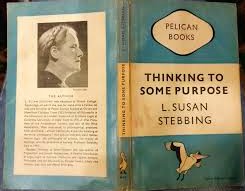Selected Reviews by Subject:- Film, TV, DVDs, CDs, media critics | Health, Medical | Jews (Frauds, Freemasons, Religions, Rules, Wars) | Race | Revisionism | Women | Bertrand Russell | Richard Dawkins | Martin Gardner

I haven't been able to find what the 'L' stands for. Her mother, née Elstob, probably shows she thought she was a Jew, although she talks of 'we English' at the start. I found Analysis of Mr Mill's System of Logic by W Stebbing, M.A., in an 1870 advert, suggesting a prolonged occupation of the dark lantern of Oxford by Jewish families. The paperback is IN MEMORIAM H.L.S. and B.P.S., for those interested in such links.
Stebbing in her preface of November 1938 gives sources of this book: autumn 1936 annual conference of the British Institute of Adult Education@a lecture, Thinking, published; this seems later than my two previous listed books. And a BBC proposal to expand it; she drew up a synopsis for twelve talk, presumably half-hour radio talks, to be advertised in the Radio Times. I list here the fifteen chapter titles, of which nine have the same titles as the proposed BBC talks,which never took place.
I PROLOGUE: ARE THE ENGLISH ILLOGICAL? | II THINKING AND DOING | III A MIND IN BLINKERS | IV YOU AND I: I AND YOU | V BAD LANGUAGE AND TWISTED THINKING | VI POTTED THINKING | VII PROPAGANDA: AN OBSTACLE | VIII DIFFICULTIES OF AN AUDIENCE | IX ILLUSTRATION AND ANALOGY | X THE UNPOPULARITY OF BEING MODERATE | XI ON BEING MISLED BY HALF, AND OTHER FRACTIONS | XII SLIPPING AWAY FROM THE POINT | XIII TAKING ADVANTAGE OF OUR STUPIDITY | XIV TESTING OUR BELIEFS | XV EPILOGUE: DEMOCRACY AND FREEDOM OF SPEECH
There isn't much point plodding through all this derivative stuff. The 'Propaganda' chapter puts all its emphasis on emotionally-toned language; in fact the suppression of evidence is much more difficult to detect, and arguably more important. The chapter on 'Testing Our Beliefs' is waffly; but, I suppose inevitably, has nothing on the way new beliefs might be generated. Her only emphasis is on pre-existing material.
Look at the year of publication: 1939. The book has an index—but Capitalism, Communism, Hitler, Mussolini, Stalin, Churchill, Roosevelt are all missing. Even the First World War is not there. Her only political awareness made explicit here was the 1926 'General Strike', of which she says she could find out almost nothing.
The book is disappointing rubbish, to be honest. My best guess is that Penguin books (Pelican is a sub-set of this; her book was numbered A44) was the mass-market paperback then-equivalent of the Manchester Guardian newspaper—a tame Jewish department and controlled opposition, reliably turning out covert Jew material, supplemented by good quality 'goy' authors who could be screwed with low royalties.
L S Stebbing wrote A Modern Introduction to Logic and Philosophy and the Physicists. Her book on physics quotes James Jeans and Eddington, and Berkeley and Newton. Jeans and Eddington were well-known for thinking God was a mathematician, is I suppose a simplish idea for simplish scientists, but with less appeal to an unmathematical woman. But of course there is nothing on Einstein, or on nuclear physics, soon to become the basis of a huge Jewish fraud.
Its odd to relate that Stebbing was one of the people who pointed out that—assuming Rutherford's observations on atoms, suggesting they were mostly empty space, were true—the appearance of solidity of tables and chairs was due to the coarseness of human senses. Many techie types can't understand that.